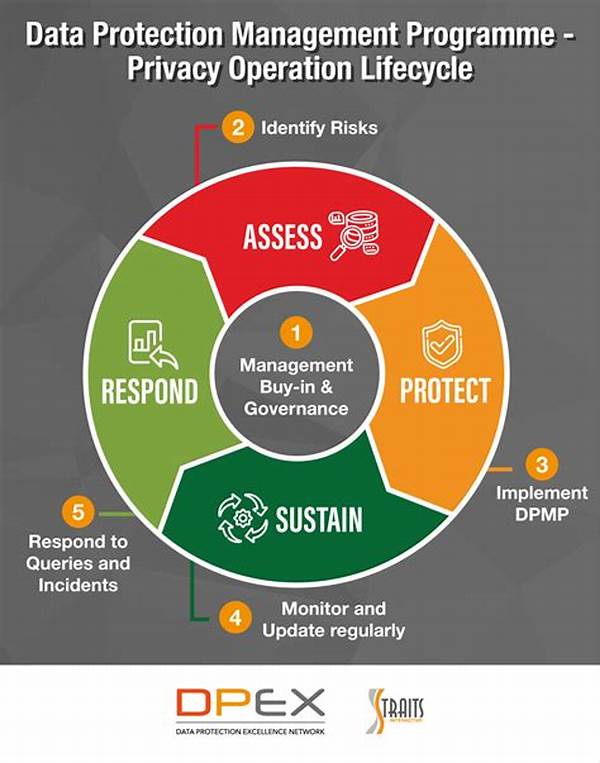In an era where data is considered the new oil, the significance of privacy management and data protection cannot be overstated. Organizations across the globe are increasingly recognizing the imperative need to implement robust strategies to safeguard sensitive information. As individuals navigate the digital landscape, there is a growing concern regarding how personal data is collected, processed, and protected. To address these concerns, privacy management and data protection have become the focal points of organizational policy frameworks. This article delves into the multifaceted aspects of these critical issues, exploring their significance, challenges, and solutions.
Read Now : Supporting Self-directed Learning Journeys
Understanding Privacy Management and Data Protection
Privacy management and data protection encompass a broad range of practices designed to ensure the confidentiality, integrity, and availability of personal and organizational information. At the heart of these efforts is the responsibility to manage data responsibly, balancing the needs of business with the rights of individuals. Privacy management involves the collection, processing, and sharing of personal data in a manner that respects individual privacy rights and complies with legal requirements. Meanwhile, data protection refers to the technical and organizational measures put in place to prevent unauthorized access, disclosure, or alteration of data.
As technology evolves, the challenges associated with privacy management and data protection have become more complex. Organizations must navigate a myriad of regulations, such as the General Data Protection Regulation (GDPR) and the California Consumer Privacy Act (CCPA), which impose stringent requirements on data handlers. Additionally, the proliferation of data breaches and cyber threats further underscores the necessity for sophisticated protection mechanisms. To mitigate risks, companies are adopting advanced encryption techniques, implementing access controls, and conducting regular data audits, ensuring that privacy management and data protection are maintained at the highest standards.
Challenges in Privacy Management and Data Protection
1. Regulatory Compliance: Organizations must ensure compliance with ever-evolving regulatory frameworks that govern privacy management and data protection. Failure to comply can result in hefty fines and reputational damage.
2. Technological Advancements: Rapid technological progress poses unique challenges for privacy management. As new technologies emerge, organizations must continuously update their data protection strategies to address potential vulnerabilities.
3. Data Breaches: The increasing frequency and sophistication of data breaches necessitate robust privacy management and data protection measures to safeguard sensitive information from unauthorized access.
4. User Awareness: Educating users about the importance of privacy management and data protection is crucial. Informed users are better equipped to make choices that protect their personal information.
5. Resource Allocation: Effective privacy management requires adequate investment in resources, including technology, personnel, and training, to implement and maintain comprehensive data protection measures.
Best Practices in Privacy Management and Data Protection
Establishing best practices for privacy management and data protection is vital in today’s digital era. Organizations should begin by conducting comprehensive data audits to identify vulnerabilities and potential risks associated with personal data handling. Implementing robust data governance frameworks ensures that data is managed consistently and ethically. Additionally, integrating privacy management and data protection into the design of new products and services—referred to as “privacy by design”—can proactively address privacy concerns.
Moreover, fostering a culture of privacy within the organization plays a crucial role. This involves training employees on data protection protocols and encouraging a shared responsibility for safeguarding information. Deploying cutting-edge encryption technologies and regular security assessments help establish resilient defenses against potential threats. Ultimately, privacy management and data protection require a continuous commitment to adapting strategies in response to evolving threats.
Read Now : “digital Platforms For Brand Storytelling”
The Role of Leadership in Privacy Management and Data Protection
Leadership plays a pivotal role in steering the direction of privacy management and data protection initiatives within an organization. Executives must champion these efforts, ensuring that privacy considerations are embedded into the strategic framework. By fostering a culture of accountability and transparency, leadership can inspire confidence among stakeholders, reinforcing the importance of protecting personal and organizational data.
Furthermore, leadership must prioritize the allocation of adequate resources to support privacy management and data protection measures. This involves investing in advanced cybersecurity technologies, ensuring compliance with regulatory requirements, and engaging in ongoing risk assessments. By demonstrating a commitment to privacy management and data protection, leaders not only safeguard the organization but also enhance its reputation in an increasingly privacy-conscious marketplace.
Emerging Trends in Privacy Management and Data Protection
Privacy management and data protection are evolving in response to new technological and regulatory landscapes. One notable trend is the rise of artificial intelligence and its integration into privacy management systems. AI technologies offer the potential to automate data protection processes, enhance threat detection, and streamline compliance efforts. Additionally, the growing emphasis on user-centric privacy practices, such as giving individuals greater control over their data, reflects a significant shift in privacy management paradigms.
Another emerging trend is the increasing collaboration between stakeholders, including governments, businesses, and non-profit organizations, to address complex privacy challenges. This collaborative approach fosters knowledge-sharing, innovation, and the development of global standards for privacy management and data protection. As digital ecosystems continue to evolve, staying ahead of these trends becomes essential for organizations seeking to navigate the intricate landscape of data privacy.
Summary: The Importance of Privacy Management and Data Protection
In summary, privacy management and data protection are indispensable components of a responsible digital strategy. With the escalating volume of sensitive data being transmitted and stored, organizations must prioritize protecting personal and organizational information. By fostering a culture of privacy and implementing robust technical and organizational safeguards, businesses can build trust with consumers and maintain a competitive edge.
The significance of privacy management and data protection is further underscored by the dynamic regulatory environment. Compliance with local and international laws is not only a legal obligation but also a strategic advantage in a data-driven world. Ultimately, by embracing a holistic approach to privacy management and data protection, organizations can safeguard their reputation, enhance customer confidence, and contribute to a more secure digital future.
